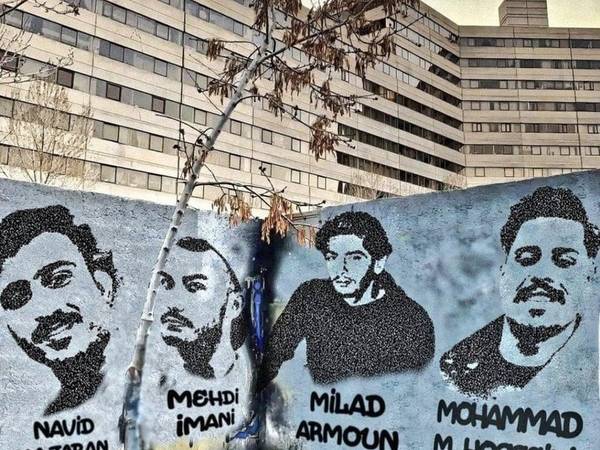The prolonged detention and transfer of four individuals accused in the high-profile 'Ekbatan case' to the notorious Ward 2A of Tehran’s Evin prison has sparked growing concerns amongst rights groups.
Their transfer has deepened fears about their well-being, the possibility of forced confessions through torture, potentially leading to severe sentences including the death penalty.
Milad Armoun, Navid Najaran, Mohammad Mehdi Hosseini, and Mehdi Imani, who have been imprisoned for almost two years, were transferred for re-interrogation to Ward 2A from Ghezel Hesar Prison in Tehran on April 30 as per reports by Human Rights Activists in Iran (HRA) on Friday. HRA reported these individuals have been in custody for 18 months, and only recently allowed brief phone calls with their families.
Sources close to their families have also warned of their families being threatened into silence and not speaking to the media.
Mohammad Hossein Aghasi, one of the lawyers of the detainees, had previously confirmed on X, in response to queries from activists about reports of their transfer to Ward 2-A and re-interrogation, stating that the detainees are in the “IRGC Intelligence [detention center]” in the process of completing “investigations” at the court’s request.
However, the pro-bono legal group, Dadban, reported on Sunday that they have been detained in Ward 2A for almost three months, citing irregularities in legal proceedings, and urging lawyers to not remain silent on the case proceedings.
Until recently, news of Navid Najarian being imprisoned concerning this case or even the date of his arrest was unknown.
Former political prisoner and activist, Foad Choobin who had met Najaran while he was imprisoned in Ahvaz Central Prison in Khuzestan Province wrote on X confirming Najaran’s date of arrest being December 5, 2022, and further revealed that he had been denied legal representation, subject to beatings and forced confessions in another IRGC Intelligence detention facility last year as well.
Ekbatan Case: Rights Violations, Forced Confessions and State Propaganda
The Ekbatan case traces back to November 2022 at the height of nationwide protests sparked by the death of Mahsa Amini who died in the custody of morality police.
A Basij force member, Arman Aliverdi, was allegedly murdered in Ekbatan on the evening of October 26, 2022, leading to a crackdown by security forces. Over 50 young residents were arbitrarily detained, with 14 facing charges such as Moharebeh (waging war against God), “assembly and collusion against national security”, “participation in intentional homicide”, and “disrupting of public peace and order." Of those arrested, some were released on bail. However, Armoun, Najaran, Hosseini, and Imani remain imprisoned and their transfer to Ward 2A further exacerbates their situation.
Following Aliverdi’s death, the late Iranian President Ebrahim Raisi visited the family of Aliverdi and Iran’s Supreme Leader Ali Khamenei also visited his grave.
A large state-sponsored funeral was held for Aliverdi. State media highlighted his role in suppressing protests, portraying him as a hero, naming him a “martyr”, and a dedicated student Basij member.
Meanwhile, the detainees were subject to forced confessions. Armoun was shown on state media, blindfolded, and handcuffed.
The Iranian government has a history of broadcasting forced confessions from detainees, a practice widely criticized by human rights organizations. Such confessions are often used as evidence in court to convict political prisoners, a tactic that Amnesty International and other groups have consistently condemned.
However, even those appearances, Armoun publicly denied involvement in Aliverdi’s death, contradicting statements made by Tehran's police chief.
"The case has many fundamental flaws," stated Dadban, quoting Payam Derafshan, one of the defense lawyers who pointed out inconsistencies and illegal actions in the judicial process. "Milad Armoun has clearly stated that he never had any weapon in his hand."
Why Rights Groups Concerned About Transfer to Evin’s Ward 2A
Ward 2A of Evin Prison is operated illegally by the Islamic Revolutionary Guard Corps (IRGC). Even officials of Iran Prisons' Organization have no access to prisoners in this ward as per reports of multiple human rights organizations including, the New York-based Center for Human Rights in Iran (CHRI).
“Prisoners in Ward 2A are confined in either solitary or shared cells and are completely cut off from the outside world. Political prisoners and prisoners of conscience inside this ward are routinely subjected to beatings and inhumane torture for forced confessions," CHRI states.
Accounts of past political prisoners who have been kept at Ward 2A throughout the years reveal shocking accounts of torture, threats of rape, beatings and forced confessions.
“This is [Ward] 2A and god can’t hear you,” the interrogators at Ward 2A of Evin prison told Arash Sadeghi, a prominent human rights activist and former political prisoner who had been taken to this ward previously.
